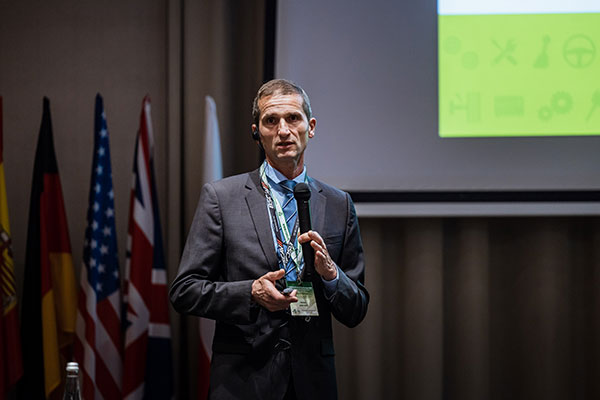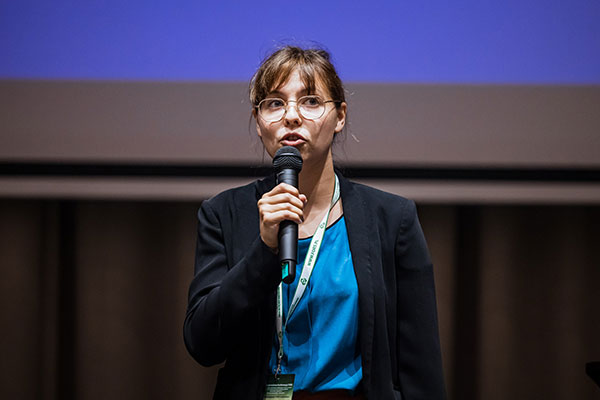The fifth FORS international conference took place in Warsaw on September 13th and 14th, 2023, hosted by FORS, the Polish Vehicle Recycling Association, coinciding with their 25th anniversary. Adam Małyszko, the association’s president, extended a warm welcome to delegates, including international participants, and provided an update on the current state of auto recycling in Poland.
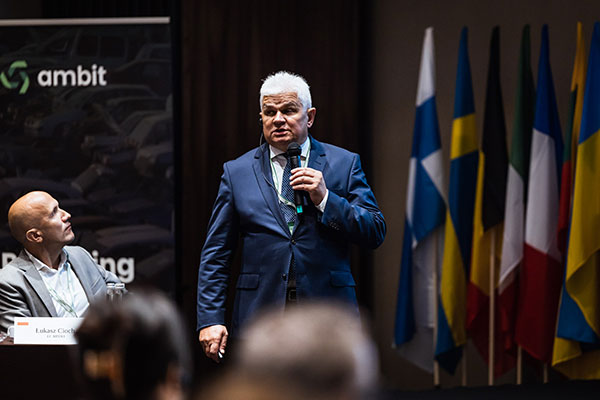
In Adam’s presentation, he pointed out a decline in the availability of end-of-life vehicles (ELVs), an increase in vehicle age due to economic factors, and a concerning issue where a significant percentage of vehicles reaching the end of their life—up to 50%—were going missing, potentially diverted to illegal operators. This theme resonated throughout the conference. He expressed his frustration at the lack of government support for prosecution efforts and the challenges faced by legal operators, who had to include VAT on their sales, reducing their competitiveness compared to grey market operators. He also highlighted absurdities in vehicle dismantling practices and the restrictions on parts sales, advocating for improved recording systems.The following speaker, Klimovich Nikolay from the KVV Group in Ukraine, shared insights into the country’s auto recycling challenges. He revealed that Ukraine had around 200,000 vehicles requiring recycling annually, with 47% aged between 10 and 30 years. Nikolay discussed the difficulties in integrating ELVs into the scrap metal sector, especially considering the lack of owner responsibility for vehicle disposal. He expressed hope that government legislation would address this issue. However, he questioned the financing for such endeavours, particularly in the context of military vehicle recycling, where there was a lack of expertise. He appealed for dialogue and assistance to tackle the industry’s turmoil, exacerbated by unprecedented challenges.
Henk Jan Nix from STIBA in the Netherlands then took the stage to provide an overview of the national auto recycling system. He noted that the country’s vehicle fleet was ageing, with a small black market, where vehicles reported as exported remained in the country for dismantling. He praised the system’s effectiveness in countering illegal operations through continuous registration and close collaboration with insurance companies. Regarding Electric Vehicles (EVs), Henk reported that there were currently no legal obligations, but some rules were emerging concerning the storage of lithium-ion batteries. He highlighted that many auto recycling facilities were investing in EV recycling, especially in safety measures, and that there were nearby facilities specialising in second-life battery use.
Following a presentation by conference sponsors, Ovoko, Henk discussed EGARA, an organisation he serves as the general secretary. He described EGARA’s role in representing European dismantlers, emphasising its independence, democratic nature, and efficiency, funded solely by association members.
The final speaker of the first morning was Martyna Robakowska, a representative of the European Commission, who gave a comprehensive overview of the recent EU ELV regulation proposal. Firstly, she highlighted the problems the current directive encountered, including a lack of circularity, the poor quality of vehicle waste treatment, the high dependency on imported raw materials, and how 3.5 million vehicles disappear without trace each year from European roads.
Martyna detailed the objectives of the impact assessment and presented the proposed changes, highlighting potential benefits if the proposal were approved, including reduced CO2 emissions, increased recycling rates, job creation, and lower prices for second-hand parts.
The afternoon session continued with a European focus, featuring representatives from France, the UK, and Spain. Claire Lichawski from Mobilians in France emphasised the need to encourage recyclers to focus on supplying spare parts and expand the eligibility of reused parts categories. She discussed challenges related to the grey market and EV treatment, advocating for better regulations.
Regarding electric vehicles (EVs), Claire mentioned that damaged EVs were beginning to arrive at authorised treatment facilities (ATFs). She also noted that Mobilians had collaborated with INERIS (The French Public Institute for Public Risk) to discuss the disposal of electric and hybrid end-of-life vehicles. Additionally, she highlighted that the environmental ministry was actively working on updating regulations for treating end-of-life vehicles (ELVs), particularly electric and hybrid ELVs, by introducing new measures.
To conclude, Ms Lichawski emphasised the expertise of ATFs in their domain and underscored the potential for reusing all parts of electric vehicles, including their batteries.
Representing the UK was Terry Charlton, a self-described ‘lifer’ of the industry with over 50 years of experience. Like others, he commented on the grey market, estimating that legal operators process 30% of ELVs and because of limited government funding, no systems are preventing unlicensed sites. He was happy to report on the growth of reused parts in the country and how insurance companies are willing to use them with several schemes in operation. When it comes to EVs, he reported that there were no requirements for disassembly stations or training, but many operators have developed facilities in their yards. Finally, he expressed concern about recent acquisitions in the UK creating a potential closed-loop situation, which would have the potential to make it difficult for operators to source vehicles outside the insurance buying network.
The final speaker of the first day was Rafael Angel Gomez Haro, President of the Andalusian AAD Association in Spain. He began by stating how the amount of deregistered vehicles in the country was declining, and in 2022 was 850,831. However, he did mention how vehicle deregistration was classified between definitive and temporary and between 1990 and 2022, there were 753,296 of these ‘zombie vehicles’. He said that since 2021, when there were no regulations, there has been improvement, with some legislation being introduced to prevent illegal operations.
However, this was progressing slowly, with minimal tools to enforce any laws to prevent such operations. Rafael said that currently, there was no EPR system in Spain. The producers did present an individual system to the government, but some autonomous communities said no, and those involved continue to discuss this matter.
When discussing EVs, Rafael said that those ATFs receiving electric or hybrid vehicles had an obligation to have accredited personnel for their handling. However, he said there were so few EVs entering dismantling yards that only one plant had obtained permission and authorisation for its total treatment and management of lithium-ion batteries. And because of the lack of companies accepting lithium-ion batteries, it has consequently created a grey market. He told us of a recent police raid at a clandestine warehouse close to housing where they discovered 45 tonnes of such batteries.
When talking of the future, Rafael hoped for collaboration between the different recycling operators, realistic economic options to avoid negative management costs for ATFs and the protection of the weakest ATFs in the recycling chain.
To round off the day, the delegates were bussed out of Warsaw to one of the AMBIT yards, where there was a guided tour before they were treated to dinner in the operating shed where vehicles are usually depolluted—a fitting venue to reflect on the day’s presentations and meet new friends.
Day two of the conference began by exploring auto recycling outside of Europe with the Ambassador of the Federal Republic of Nigeria to Poland, His Excellency (Rtd) Major General Christian Ugwu, (6) accompanied by Kenneth Okafor (10) from O-KEN Auto Export.
Kenneth reported that there were currently just under 12 million vehicles in Nigeria and that 60% of these vehicles were over 12 years old. Still, there were very few ATFs to dismantle these vehicles and provide the much-needed spare parts.
Both gentlemen emphasised that there was much work to be done in the country with much potential but expressed a need for expertise and cooperation to achieve this.
The day’s second presentation was from Marty Hollingshead, representing the ARA and the USA. Marty reported that auto recyclers in the USA generated $32 billion in used parts and employed 140,000. Like in Europe, the US also suffer from the challenges generated by illegal operators, which he stressed created a negative perception of authorised recyclers. He said enforcement was difficult due to a lack of resources and state differences in licensing and judicial challenges. However, there was hope, as in 2017, California established a Vehicle Dismantling Industry Strike Team to identify illegal activities and, since then, has brought 1900 cases throughout the state, something that the ARA encourages all states to adopt.
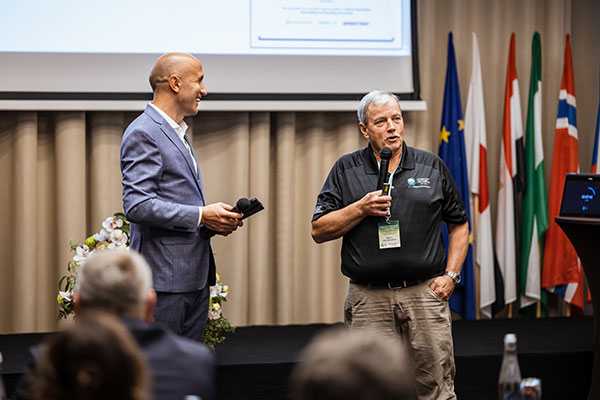
He pointed out several challenges concerning the sale of recycled parts, including efforts to change laws related to the sale of recycled original equipment (ROEs) and original equipment manufacturers (OEMs) discouraging the use of used parts. Additionally, newer vehicle models increasingly incorporated VIN-specific components, limiting the use of recycled parts for repairs.
Nevertheless, Marty expressed optimism about changing attitudes toward recycled parts, driven by growing environmental and sustainability concerns among the public, politicians, and the corporate world. He noted that vehicle recyclers could play a role in addressing these concerns while creating opportunities for themselves. Furthermore, he highlighted a shift in OEMs’ willingness to explore recycled original equipment for repairs. He also emphasised how the ARA is leading the industry in the transition to EVs, concluding that the success of EVs relies on the successful alignment of economic incentives with environmental benefits – a model exemplified by the US automotive recycling industry over a century.
Next, Juny Nam from GoodByeCar, travelling from Korea, provided his perspective. In contrast to other continents, Juny reported that illegal dismantling and catalytic converter theft were rare in Korea due to compulsory association membership, granting access to the government computer system. He highlighted the responsibility placed on vehicle owners to dispose of their vehicles properly and the use of private investigators to prosecute illegal operators. Juny also mentioned specific requirements for registering yards in the country, including a minimum equipment threshold.
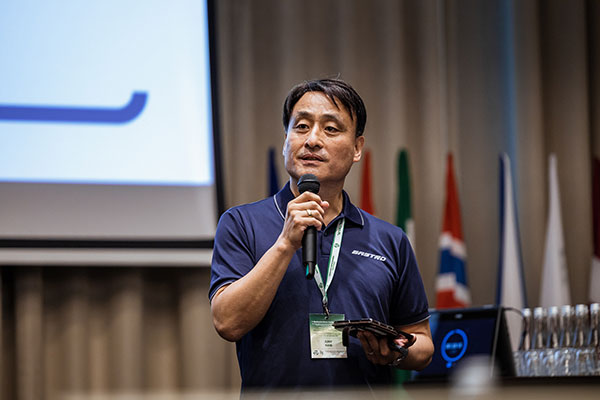
He observed that the average age of cars in Korea was increasing, currently standing at 15.5 years. As the vehicle fleet aged, the availability of end-of-life vehicles decreased. The rise in land prices and the establishment of more vehicle recycling companies contributed to diminishing turnover and profits in the industry. To counter this trend, a new online parts-selling platform was introduced, and a new business license for treating EV batteries was on the horizon.
Staying in Asia after flying for 22 hours, Prof. Kenichi Togawa, brought the delegates up to date on auto recycling in Japan. He reported the biggest challenge for Japanese auto recyclers was the availability of ELVs, as many vehicles were exported overseas because of high demand. Like in Korea, he said there is little concern about the grey market as it is minimal, and the police will arrest someone who dismantles a vehicle illegally. However, he did have concerns about foreign operators operating close to the international airport, which may not necessarily be operating illegally but, in his view, were not being supervised sufficiently by the authorities.
Togawa then said that insurers play an important part in the dismantling sector but have no specific legal obligation. Also, there was a type of auto insurance that recommended recycled parts for repairs, which is sold at a low insurance rate but is currently not widespread. He then said that although there was a 32% market share of Hybrid vehicles in the national car parc, there was no legal requirement to dismantle such vehicles, but most handlers were trained in the safety high voltage vehicles. However, because so many of these types of vehicles were exported, there were few cases of ATF handling such vehicles. Another challenge for ATFs in Japan, like in other countries, was the difficulty obtaining staff.
Returning to the USA, Sue Schauls from Iowa Automotive Recyclers talked about the certification of companies selling sensitive parts. When it came to environmental compliance assurance, she said that in most well-run yards, environmental compliance’s most significant challenge was maintaining records. However, using the CAR Program Environmental Standards and resources, it was easy to achieve compliance and assurance. When it came to ‘sensitive’ parts, she said how the ARA recall certification program was designed to handle all such vehicle parts, now and in the future of the industry and how high voltage batteries could fall into this category. She said such certification was universal and encouraged the delegates to learn more through the ARA.
Juny Nam then returned to the floor to discuss the application of batteries from electric vehicles, which he is exploring in Korea. He said it is difficult to obtain detailed information at the moment, but in 2024, Korea’s Ministry of the Environment intends to affect the right to repair, which might improve this. He thought there was a massive opportunity for vehicle recyclers in the upcoming EV era. After 2030, an extensive collection infrastructure of end-of-life EVs will be the primary key for battery recycling. He then went on to explain how he was actively seeking to purchase such batteries to carry out his own research into second use and provide an inspiring example as he has been able to provide battery packs to Ukrainian drone operators fighting the war.
Shifting back to Europe, Jaco Huisman , policy officer on the ELV Directive, joined the discussion via video link. He outlined the main objective of the proposal, emphasising its potential to boost circularity and stimulate cooperation in the automotive sector. Various speakers, including Henk Jan Nix, expressed their thoughts on the proposal. While they welcomed certain aspects, such as compensation for non-profit material removal via extended producer responsibility and limiting the export of used vehicles by linking it with their roadworthiness, they raised concerns about parts not permitted for reuse and the delivery of EVs to authorised treatment facilities free of charge without batteries, a point that Claire Lichawski also echoed from Mobilans. Adam Małyszko agreed with this but said he was still waiting to read the proposal in Polish. Rafael Gomez expanded on the need for the proposal to be translated and how the various participating countries would interpret its provisions, in particular with respect to extended producer responsibility. Overall, the speakers expressed satisfaction with the proposal, with happiness ratings ranging from 80 to 95%.

Jaco elaborated on the restrictions on exports, which were designed to deter illegality with the hope of reducing checks by 65% through better enforcement. Martyna Robakowska acknowledged the proposal’s imperfections but stressed that mechanisms were in place to address interpretation issues. Jaco clarified that the list of non-reusable parts was determined based on safety and environmental considerations and best practices.
Regarding the timeline for regulation, Martyna mentioned a busy parliament schedule and potential delays due to upcoming elections (May 2024). Jaco added that discussions on critical raw materials could also impact the regulation’s timeline, as this issue is contributing to the EU’s strategic autonomy, and ELV regulation proposal is one of the key deliverables in this field.
Finally, Ana Cecilia Martínez from Mexico shared insights into the state of auto recycling in Mexico. She noted the presence of over 55 million vehicles in the country, with 70% being imported. However, despite the significant number of vehicles, there were only 27 authorised centres for end-of-life vehicle processing, leading to challenges like abandoned cars.
Ana Cecilia highlighted the lack of official data on vehicle recycling in Mexico and the absence of plans to address issues like the shadow economy, vehicle theft, and the parts market. Nevertheless, she expressed hope as both companies and the government were acknowledging these challenges and working to attract investment to develop the country’s auto recycling industry.
After a deluge of information with a combination of experienced and knowledgeable speakers, the evening was another excuse to enjoy everyone’s company with a gala night fitting to celebrate FORS’s 25th anniversary and to reflect on the very well-organised two days dedicated to the world of auto recycling.
All images courtesy of FORS




